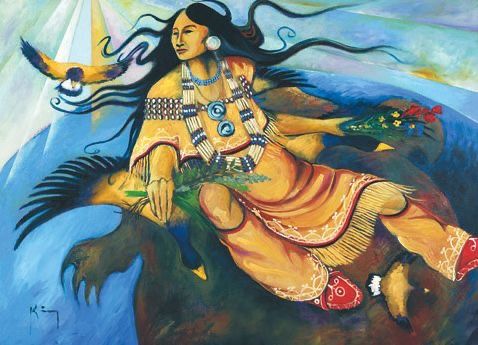https://libguides.marist.edu/c.php?g=1314310&p=9677364

Artwork mentioned by Robin Wall Kimmerer in Braiding Sweetgrass.
https://libguides.marist.edu/c.php?g=1314310&p=9677364

Artwork mentioned by Robin Wall Kimmerer in Braiding Sweetgrass.
We are all familiar with the Christian answer: peopleonce lived in a state of innocence, yet were tainted by original sin.We desired to be godlike and have been punished for it; now we livein a fallen state while hoping for future redemption.
Compare this with the Indigenous idea of Skywoman in the opening chapter of Braiding Sweetgrass: Indigenous Wisdom, Scientific Knowledge, and the Teachings of Plants by Robin Wall Kimmerer, which tells a dramatically different story.
On one side of the world were people whose relationship with the liv-ing world was shaped by Skywoman, who created a garden for the
well-being of all. On the other side was another woman with a garden and a tree. But for tasting its fruit, she was banished from the garden and the gates clanged shut behind her. That mother of men was made to wander in the wilderness and earn her bread by the sweat of her brow, not by filling her mouth with the sweet juicy fruits that bend the branches low. In order to eat, she was instructed to subdue the wilder-ness into which she was cast.
Its amazing how two origin stories with such similarities lead us to such different cultures and civilizations. The founder effects can be incredibly powerful.
“You are free to eat from any tree in the garden;(W) 17 but you must not eat from the tree of the knowledge of good and evil,(X) for when you eat from it you will certainly die.”
God instructed Adam and Eve to eat whatever they desired, though prohibited them to eat from the tree of the knowledge of good and evil. In Robin Wall Kimmerer's "Skywoman Falling", she explained how in Indigenous culture, they follow Original Instructions. These "instructions" are not rules but rather guidelines for each person. Kimmerer explains how during Skywoman's time, the first people's understanding of the Original Instructions were to care for the and have respect for hunted animals, value family, and hold respectful ceremonies for their beliefs.